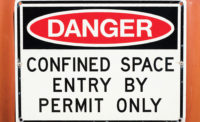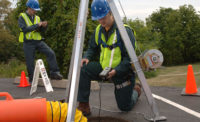Up at the front of the class, Rick Fulwiler, the former head of Procter & Gamble's worldwide safety and health department, is explaining how safety relates to the three main concerns of most CEOs: people (safety maximizes their productivity), brands (safe operations build public trust), and profits (each lost-workday case costs $24,600).
The students listening to "Professor" Fulwiler are what make this course different. Sitting in teams around square tables are 31 sales representatives and product managers from businesses that make and distribute safety gear: companies such as DuPont, 3M, Texas Mill Supply, and Safeco.
A long week: This was the scene last November at a Holiday Inn in Louisville, Ky., where these sales and marketing reps spent five full days (from 8 a.m. to 5 or 6 at night) receiving cross-training in more than two-dozen safety and health topics. Lesson modules ranged from PPE, disaster planning, and workers' compensation to construction safety, behavioral principles, and industrial hygiene exposure levels. At the end of the week, students took a one-hour competency exercise. If they passed, they'd be able to distinguish themselves in the field as Qualified Safety Sales Professionals (QSSP).
What it means to you
Why should you care about a sales training course? Because you're going to begin seeing the "QSSP" designation turn up on business cards when sales reps call, and in safety and health product ads in magazines such as Industrial Safety & Hygiene News. More than 100 sales and marketing people have taken the course in the past two years, which is being heavily promoted by three co-sponsoring industry groups: the Industrial Safety Equipment Association (representing safety manufacturers), the Safety Equipment Distributors Association (representing distributors), and the Safety Equipment Manufacturers Agents Association (representing salespeople working as manufacturers' agents).There's another reason you should know about the QSSP program: In this era of lean and mean safety and health departments, knowledgeable product sales reps can be more of a resource than you might imagine.
After all, did you ever think sales reps would be getting trained in how to analyze OSHA logs to identify injury trends and cost-savings potential by the likes of Fulwiler and the two other QSSP instructors, Larry Wilson (a former OSHA compliance officer), and Bill Simkins (an industrial hygiene and loss control specialist)?
These are not your father's old safety supply house sales reps. No, you could call this the new breed of safety salesperson. Someone looking for an edge in a very competitive market with products available through catalogs, over the phone and Internet, at Home Depot and other retail stores, from small to mid-size safety specialty distributors, and from large general mill supply houses. As a result, vendors are looking for ways to be more valuable to customers. One way is to upgrade the quality and breadth of services offered through training courses such as QSSP.
Meeting customer demands
Customers are demanding more sophisticated service. In a survey of ISHN readers, 76 percent say service is a very important factor when purchasing PPE. 47 percent say technical training is very important, and 40 percent say the same for OSHA compliance assistance. But the QSSP course goes beyond traditional technical training, such as respirator fit testing. For instance, the Day 4 quiz had this question: "Briefly describe the Experience Modification Factor and how it can be used by the Safety Sales Professional."QSSP organizers are careful not to over-hype their program. "This is not a certification course," says Fulwiler. "It is not challenging enough, deep enough, or comprehensive enough." But if you're handed a business card with the QSSP designation on it, it should be a tip-off that you're dealing with a sales rep who's ready to do more than push product and tout price.
In fact, a number of students at this QSSP course talked more like consultants than sales reps when describing their jobs. "I have a customer I'm seeing next Friday who has a big problem with hand lacerations. I'm going to do an assessment of their hand protection needs, look at the behaviors behind the accidents, and look at the cost of lacerations."
Vendors call this consultative selling. "Partners in prevention" is how Fulwiler describes the role sales reps can play. This kind of talk raises important questions: What resources are your product sales reps offering? And what services could make life easier for you? Ask, and you might be surprised at what reps are prepared to do. Just make sure they are trained to deliver on their promises.
The next Qualified Safety Sales Professional course will be held March 9-13, 1998, in Louisville, Ky. For more information contact the Safety Equipment Distributors Association (410) 931-8100.





